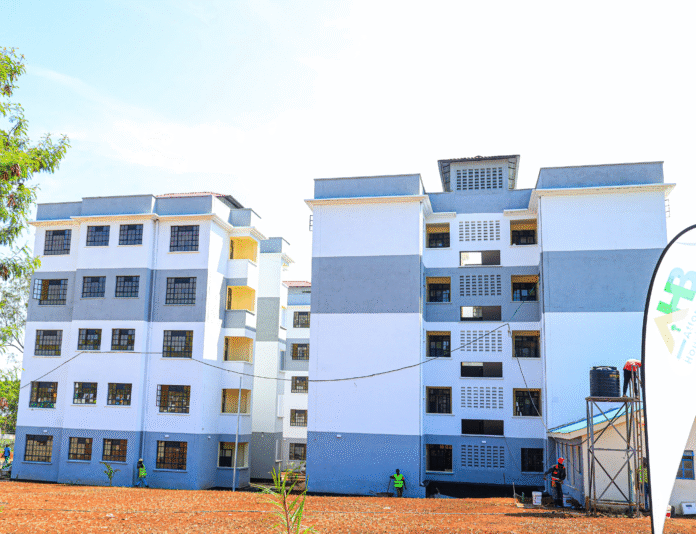
Kenya has achieved a major milestone in its Affordable Housing Programme with the completion of the Boma Yangu project in Homa Bay County—one of the first housing developments in Africa to receive the prestigious Excellence in Design for Greater Efficiencies (EDGE) certification.
The recognition places the Homa Bay project on the global map as a benchmark for sustainable, low-cost urban housing.
Located a few kilometres from Homa Bay Town along the Homa Bay–Kendu Bay road, the project is a joint venture between the National Housing Corporation (NHC) and the County Government of Homa Bay. It was launched in 2023, and its first phase is now complete.
EDGE is an international green building standard developed by the International Finance Corporation (IFC) to encourage resource-efficient construction. To qualify, a building must achieve at least 20 per cent savings in energy, water, and embodied energy in materials.
The Homa Bay housing estate surpassed those benchmarks, achieving savings of 27 to 30 per cent in energy, 32 to 37 per cent in water use, and an impressive 52 to 62 per cent in embodied energy.
“The EDGE certification affirms our commitment to building smart, sustainable homes,” said Engineer Thomas Ofwa, a technical lead on the project. “We’ve incorporated features like solar lighting for common areas and streets, and water-saving aerators on taps.”
The buildings are designed to optimise natural light and ventilation, thanks to strategic orientation, window sizing, and ceiling height. These features allow residents to live comfortably without fans or air conditioning, even in Homa Bay’s warm climate.
Local Impact: Jobs, Skills, and Community Uplift
Beyond sustainability, the project has had a deep social and economic impact on the local community. According to project officials, over 2,000 skilled and unskilled workers—drawn from the local population—were employed during construction.
“Many young people here had no jobs. This project gave us a chance to earn, to learn, and to stay focused. It changed our lives,” said Bernard Ojijo, a mason who worked on the site.
“It’s not just about the houses,” added Justus Mwangangi, a painter. “These projects help us grow professionally and allow us to provide for our families.”
Local artisans in the informal sector earned over KSh11 million through contracts to supply doors and windows. Additionally, women’s groups were engaged for landscaping services, earning more than KSh1 million.
“This project is a blessing to Homa Bay,” said Engineer Ofwa. “From jobs to business opportunities, everyone has benefited.”
110 Units Delivered in Phase One
The first phase consists of 110 housing units: 38 two-bedroom apartments, 40 one-bedroom units, 30 studio apartments, and two studio-shop combinations. The houses are part of President William Ruto’s flagship Affordable Housing Programme, which targets the delivery of 200,000 housing units annually nationwide.
President Ruto is expected to officially hand over keys to the successful applicants, selected through the Boma Yangu online portal.
County–National Partnership Praised
Homa Bay Governor Gladys Wanga hailed the development as a testament to effective collaboration between national and county governments.
“This project aligns with our vision to provide decent housing to our people while empowering local communities,” she said during a recent inspection tour.
The Homa Bay model is more than just housing—it is designed to create vibrant, livable communities with green spaces, paved roads, water and sewer systems, and solar-powered lighting.
A senior official from the State Department for Housing and Urban Development noted, “Affordable housing is not just about affordability. It’s about dignity, health, and environmental responsibility.”
Tackling the Urban Housing Crisis
Kenya faces a housing deficit of over two million units, growing by 200,000 every year. Most of the shortage affects low- and middle-income earners, who are priced out of the formal housing market. Over 60 per cent of urban residents live in informal settlements lacking basic services.
By earning the EDGE certification, the Homa Bay project aligns Kenya’s public housing with international climate goals and the UN’s Sustainable Development Goal 11: creating inclusive, safe, resilient, and sustainable cities.
The International Finance Corporation highlights that the global building sector contributes nearly 40 per cent of energy-related carbon emissions. Projects like Boma Yangu are essential to reducing this footprint.
The Homa Bay success story is expected to guide similar developments in other counties including Kisumu, Machakos, Nakuru, and Nairobi, where the government is expanding the housing programme through Public-Private Partnerships (PPP).
All beneficiaries were vetted and selected through the Boma Yangu digital platform, which aims to ensure fair access to genuinely low-income Kenyans.






